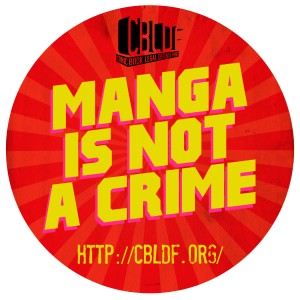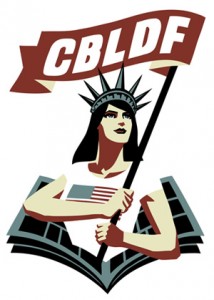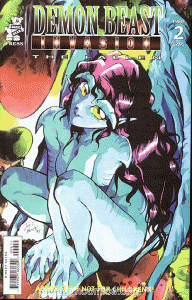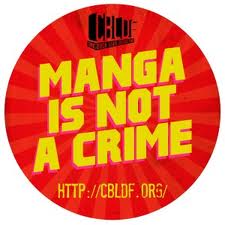 Manga is changing the world, with an expanding culture of fandom across the globe. While growing in popularity, the medium is also one of the most misunderstood, leading to criminal prosecutions in the United States, Canada, Japan, and elsewhere. On October 14, CBLDF Executive Director Charles Brownstein presented “Defending Manga,” a NYCC panel that presented a short history of manga censorship in the USA. More importantly, attendees got a chance to hear from Ryan Matheson, who stood up to Canada Customs when they prosecuted him for having manga on his computer.
Manga is changing the world, with an expanding culture of fandom across the globe. While growing in popularity, the medium is also one of the most misunderstood, leading to criminal prosecutions in the United States, Canada, Japan, and elsewhere. On October 14, CBLDF Executive Director Charles Brownstein presented “Defending Manga,” a NYCC panel that presented a short history of manga censorship in the USA. More importantly, attendees got a chance to hear from Ryan Matheson, who stood up to Canada Customs when they prosecuted him for having manga on his computer.
The year was 2010. One of the deadliest earthquakes in history struck Haiti. An online organization called Wikileaks releases covert and classified internal reports about the United States-led involvement in the war in Afghanistan. The world lost Gary Coleman, J.D. Salinger Leslie Neilson, Corey Haim, Frank Frazetta, and many others. Toy Story 3 topped the box office and Justin Bieber was crowned “Artist of the Year” at the American Music Awards. On April 15th, 12.1 million Americans were at home watching Survivor: Heroes and Villains on CBS.
At the same time, a very different battle was being waged in a foreign land.
In that country, a prisoner sat in a cold cell struggling to keep warm. He approached the bars and asked his jailors for the jacket that they had confiscated from him or a blanket to place on the cold hard concrete that had become his bed. It had been hours and hours since the prisoner’s last meal, yet his numerous requests for food and drink repeatedly were denied. In response, the guards scoffed “What do you expect?” and laughed that they would “talk to the chef.” The prisoner made another plea to speak to the US Embassy. One guard asked, “Are you serious? I don’t think we have that here,” and walked away. Later, other guards taunted and threatened the prisoner that his crime was so bad that he was being sent to a special place where “if you get raped in here, it doesn’t count.” A female guard glared at him with hatred and disgust in her eyes. But, who could blame her — after all, this prisoner was dangerous: a deviant and a pervert. And worse, the prisoner was a foreigner. He had dared try to invade and bring his destructive wares into her country. Thankfully, diligent border customs officials had caught the fiend.
This story did not take place in an underdeveloped nation on the other side of the world. Instead, it occurred in America’s neighbor, Canada. The prisoner’s name was Ryan Matheson, and his only crime was being a fan of Japanese manga. It was the possession of that manga that resulted in Ryan being charged with the possession and importation of child pornography by the Canadian Government. After two years, the involvement of the American Comic Book Legal Defense Fund and its Canadian equivalent, the Comic Legends Legal Defense Fund, and over $75,000 in litigation fees, the charges were dropped in February, 2012.
On October 14, 2012, Ryan spoke to a sold out New York ComicCon and told his story at during “Defending Manga.”
 Before the panel started, Charles Brownstein, the Executive Director of the CBLDF, escorted Ryan into the room and told him to have a seat. Despite the row of chairs on the stage and another section just off the stage, with seats for VIP and media, Ryan quietly took a seat in the front row of the audience. Soon, the rest of those seats were filled with fellow comic and manga fans. To say that Ryan fit in would be an understatement. He perfectly blended in and was indistinguishable from the people around him. Indeed, one person appeared surprised when he stood up after Brownstein introduced him as “the man who fought back.”
Before the panel started, Charles Brownstein, the Executive Director of the CBLDF, escorted Ryan into the room and told him to have a seat. Despite the row of chairs on the stage and another section just off the stage, with seats for VIP and media, Ryan quietly took a seat in the front row of the audience. Soon, the rest of those seats were filled with fellow comic and manga fans. To say that Ryan fit in would be an understatement. He perfectly blended in and was indistinguishable from the people around him. Indeed, one person appeared surprised when he stood up after Brownstein introduced him as “the man who fought back.”
Ryan took to the stage and sat down. Clearly nervous, he told his story:
Ryan is a computer programmer. He is also a comic and manga fan and an amateur artist. Like many fans, Ryan had met a group of friends online that shared the same passion. In 2010, Ryan accepted an invitation to visit his friends in Canada. “It was my first trip pretty much anywhere, and I was excited.”
On April 15, 2010, Ryan landed at the Ottawa International Airport. He remembered standing in line in customs and looking forward to meeting the people he had only spoke to online who were waiting for him in the baggage claim area. Ryan explained “I was second to last in line. I got a text from my friend asking, ‘R U there?’ I decided to wait to respond, which turned out to be a mistake.”
The customs officials saw that Ryan had brought several pieces of computer and electronics equipment. Ryan mumbled a justification to the audience, “I’m kind of geek and brought a whole bunch of stuff with me.” He appeared relieved when the audience gave an understanding chuckle since his comment described most of the audience. There was no need for Ryan to justify himself here; he was among friends. Perhaps sensing this, Ryan continued his story in a more relaxed and confident tone.
When the Customs officials saw Ryan’s equipment, he was escorted to a separate location and questioned. Not having traveled internationally before, Ryan thought all this was common. He mentioned his friends were waiting for him, and the officials asked how he had met them. He said, “I told customs that I met my friends in an online chat room, which was apparently red flag.” After that, they searched his electronics for over several hours. Ryan was still unconcerned and even gave the customs officials his usernames and passwords.
As his laptop booted, a custom official noticed a manga/anime drawing of a provocatively posed girl appeared on the screen. “The agents saw my wallpaper and their eyes lit up when they saw an art book page, of a girl in summer.” Ryan was quick to add, “She wasn’t nude or anything.”
Still, the agent said, in a serious tone, “You should really not bring this stuff into this country.”
Ryan nodded, still unconcerned. “Two hours later, I was put into detention.” The customs officials kept asking Ryan about the images on his computer. “The customs agents really had no idea what they were looking at or what to do.”
Of particular concern was an image entitled “The 48 Positions: Moe Style.” The image was a parody image of “The 48 Sumo Positions,” done as “The 48 Sex Positions.” The Moe style of animation features a style of cute characters and was brought to prominence in series like Sailor Moon. The image Ryan had featured tiny super-deformed images of characters doing the act — these images did not even have genitalia. Brownstein interjected that “It’s clear to us what this was. But, the inspectors believed the characters to be four-year-olds.” Still, he stressed that this was not a photograph with real people in it, “No children were hurt in the creation of this drawing.”
Then, things became more intense as Ryan explained, “The customs people told me that they could only keep me for four hours. So, they called the police, which is when I knew something was up.”
For some reason Ryan did not mention just how questionable that arrest was. As explained in the Charter Notices filed in the case (which are available on the CBLDF site), shows just how close a call these images were.
For example, the Notice of Application states:
[A Customs Agent] indicated that an officer had discovered animated images on the suspect laptop computer and that they were not sure if the images constituted pornography [emphasis added]”; then, at 6:40 p.m., [The Agent] must have been wrestling with the same uncertainty because, according to his Investigative Action, he “contacted [a detective in] the HighTech Crime Team, and she advised that the images would constitute child pornography. [the Detective] requested that the suspect be arrested and transported to the cells at the Central Station” [emphasis added].
A supplemental Application points out:
That [the Detective] made this determination without having seen the images in question and, furthermore, formed reasonable and probable grounds for the [Ryan’s] arrest and detention without viewing the impugned images.
In short, Ryan was arrested for borderline images that the police had not even seen. Ryan continued in a more serious tone. “The police put me in cuffs and stripped searched me.” But that wasn’t the most embarrassing part of his arrest. “When I was brought in, the police woman on duty asked what I did. When they told her, she looked…the look she gave me was…it was like I was the worst person on the planet.”
They took him down to a jail cell. “It was freezing cold and they took my jacket. They told me that the custom guys said, ‘we don’t know what this is so you’ll have to stay overnight.'” Ryan expanded on the conditions he was forced to endure. There were no pillows and none were provided even though he had asked several times.
In addition to the cold, Ryan had not eaten in hours and was starving. His requests for food were met with disdain (“You’re in jail, dude, what do you expect?”) and ridicule (“we’ll check with the chef”). Eventually, Ryan was forced to use toilet paper as a pillow and tried to get some sleep.
Ryan’s voice became nervous again as he explained, “The whole time they used intimidating language. During transport, when you are charged with…charged you with the kind of thing I got charged with, you are supposed to be in solitary. They didn’t initially do that.” Ryan also said they also slammed door on his head.
During his trip to detention, one guard appeared concerned as to what the general prison population would do to Ryan and advised him to make up a crime to tell his cellmate so that he wouldn’t be attacked. However, another guard simply said, “We are sending you to a special place. If you are raped in there, it doesn’t count.”
Ryan’s detention lasted for five days. His cellmates were a drug dealer and a mentally unstable guy who reeked. “The drug dealer was nice.” Ryan reminisced, which elicited uncomfortable laughter from the audience.
Ryan was eventually released and allowed to return home to await his trial. But the Canadian government imposed severe restrictions on him. “My lawyer didn’t like the restrictions.” He said he knew he had to get out of there. “Jail wasn’t the worst part — the restrictions were.” These restrictions included obvious terms like the fact that he could have no contact with minors. But there was an additional prohibition that stated that Ryan could not use computers or the internet except for when he did work with a specific company, even though Ryan worked as a freelancer for multiple companies. “The computer thing was really difficult,” Ryan admitted. Things got worse when his company cut back on his hours. “I couldn’t even apply for another job because you had to do it online.” So, after a year, Ryan had to fly back to change his restriction to “no computers outside of work.”
“Even then it is really hard. I couldn’t use computers for a long time and most of my friends were online. I know some people that can’t stand to be away from their computers when they are on a short vacation.” Ryan’s prohibition went on for 22 months. Ryan summed it up as “ridiculous.”
Brownstein interjected, “For someone like Ryan, this was like a 22 months in an isolation chamber.”

 At this point, the CBLDF and the CLLDF got involved and provided Ryan money and expertise for his defense. Ryan said, “Always blows me away how great these organizations were. With their help, I decided to take it on.”
At this point, the CBLDF and the CLLDF got involved and provided Ryan money and expertise for his defense. Ryan said, “Always blows me away how great these organizations were. With their help, I decided to take it on.”
For months, his lawyers (Michael Edelson and Solomon Friedman of Edelson Clifford D’Angelo LLP) had tried to get the charges reduced charges to obscene material. Each of these attempts failed. Ryan pointed out, “We went through three or four prosecutors. The first was insanely inetense and insisted on all the restrictions. However, the last prosecutor tried to get the original plea.” Ryan explained, “They offered me 14 days, but then I would be put on the sex offender list.”
Ryan then talked about how he had called his mother and told her he was thinking about taking the prosecutor’s offer and ending his nightmare. Ryan said, “And my mom told me that she was ok with me taking the plea if I really believed that I had done something wrong. Hearing this, I kind of lost it. I decided I wasn’t going to take the plea. I told my lawyer, ‘set the trial day.’”
Ryan, with that same fire in his eyes told the audience, “I love anime and manga. I was going to fight for it, and go to trial.”
The trial was originally scheduled to be seven days long. Now, this may appear to be unusually long trial for the review of two manga images (the 48 Positions piece described above and something from the Mahô Shôjo Ririnana anthology also found on Matheson’s computer.) Brownstein explained that “the trial was long because we had such a strong defense.” He pointed out that a copy of the defensive materials can be found on the CBLDF website. Brownstein added with a smile, “We get dire wolves and we deploy them.” Unfortunately, those wolves are expensive. Thankfully, for Ryan, they are also effective. Browstein explained, “In February of this year, all criminal charges were dropped for this art that he loves and we love.”
Ryan Matheson’s ordeal was over.
He had won.
The room filled with the sound of vigorous applause.
“They said, ‘we dare you to fight’ and Ryan took the challenge.” Brownstein praised. “He put everything on the line for the art that he loves.” He is a hero.
So, if Ryan is the hero of this story, then who was the villain? Was it the custom officials, who kept Ryan for hours while they tried to decide what to do with his computer? Was it the police, who kept Ryan detained and ignored his pleas to speak to the US Embassy? Was it the string of overzealous prosecutors who pressed for severe restrictions on Ryan’s livelihood? Who is the villain of this piece?
Stephen Covey once said, “We tend to judge others by their behaviors and ourselves by our intentions.” Ryan was treated horribly and condemned for something that we know he did not do. And it would be very easy to judge the actions of the Canadian authorities and lay blame in this situation. But, that would be unfair to the people who thought they were doing the right thing. It would be unfair to people who have dedicated their lives to public service and to protect their nation. So, the villain is not the government, the border patrol, the lawyers, or the police officer. The enemy of this story is much larger and older and has plagued comics industry since the 50s and terrorized other aspects of civilization and culture long before that.
The villain of this piece is the fear of the unknown and ignorance that created the stigma against manga.
Earlier in the panel, Brownstein pointed out that this fear frequently causes well-meaning to people to lash out against new media and forms of entertainment. In the 1920s, jazz was considered the devil’s music. Since the 1970s, heavy metal music has been blamed for everything from riots to murder. More recently, rap music has been blamed for violence against women and criminal behavior.
But one does not need to look to the music industry to see these kinds of attacks. Brownstein pointed out that this is not the first time this villain has been a threat to comics. As fans know, in the 1950s, Fredrick Wertham and the Senate caused the Great Comic Book Scare which resulted in imposition of the Comics Code Authority. As a result, many comics vanished from the shelves, and more than 800 creators lost their jobs. The villain returned in the 1970s, when law enforcement officials seized underground comix and prosecuted the stores that sold them. The villains attacked again in 1986 in Lansing, Illinois, where a comic store owner was arrested and convicted of the possession and sale of obscene materials because of the comics he sold. This time, the industry was ready. It banded together to raise money for his successful appeal. The remainder of the money raised went to founding the CBLDF.
Brownstein added, “Since 2000, manga has been the target of legal controversy.”
And there had been some notable losses.
 Brownstein discussed Castillo v. Texas, a 2002 court decision in which Jesus Castillo was convicted for selling a clearly marked adult-oriented manga (CPM Manga’s Demon Beast Invasion: The Fallen) to an adult undercover officer. This case was particularly notable because the CBDLF had brought several experts including Scott McCloud, who testified that 68% of “comic books” are purchased by adults, and that the movement of manga and graphic novels has moved far beyond the more “child-friendly” comics of Archie or “Silver Age” superheroes. He also testified about the quality of the drawings as art. Manga and anime exert Susan Napier testified at length about the nature of the Japanese mind, Japanese hentai manga, and the actual storyline in the manga itself. In response, the prosecution provided no testimony to refute the expert witnesses provided by the CBLDF. Instead, the closing statement provided by the prosecutor attorneys, effectively sealed a guilty verdict for one count of obscenity:
Brownstein discussed Castillo v. Texas, a 2002 court decision in which Jesus Castillo was convicted for selling a clearly marked adult-oriented manga (CPM Manga’s Demon Beast Invasion: The Fallen) to an adult undercover officer. This case was particularly notable because the CBDLF had brought several experts including Scott McCloud, who testified that 68% of “comic books” are purchased by adults, and that the movement of manga and graphic novels has moved far beyond the more “child-friendly” comics of Archie or “Silver Age” superheroes. He also testified about the quality of the drawings as art. Manga and anime exert Susan Napier testified at length about the nature of the Japanese mind, Japanese hentai manga, and the actual storyline in the manga itself. In response, the prosecution provided no testimony to refute the expert witnesses provided by the CBLDF. Instead, the closing statement provided by the prosecutor attorneys, effectively sealed a guilty verdict for one count of obscenity:
I don’t care what type of evidence or what type of testimony is out there; use your rationality; use your common sense. Comic books, traditionally what we think of, are for kids. This is in a store directly across from an elementary school and it is put in a medium, in a forum, to directly appeal to kids. That is why we are here, ladies and gentlemen. We’re here to get this off the shelf.
Castillo was sentenced to 180 days in jail, a $4,000 fine, and one year probation. His appeal failed, and he served a suspended sentence
Brownstein next turned to U.S. v. Whorley, the first case to test manga within the confines of the PROTECT Act, which expanded the definition of child pornography to include a non-photographic images such as drawings, cartoons, sculptures, or paintings. In the case, Dwight Whorley, a previously convicted sex offender, used computers at the Virginia Employment Commission, a public resource, to download manga alleged to depict “children engaged in explicit sexual conduct with adults.” He was charged with “knowingly receiving” child pornography for printing out two cartoons and viewing others, 19 counts in all. The jury found him guilty and he was sentenced to 20 years in prison, with a 10-year probation thereafter. The CBLDF was not involved in this case. However, when discussing it, Brownstein was careful to stress that, “ The CBLDF would not have defended Whorley on the portion of the case dealing real child pornography. However, we would have provided substantive assistance in any the portion of the case involving the manga.”
Brownstein also discussed U.S. v. Handley. In that case, Christopher Handley, a manga collector, was arrested on possession of child pornography charges after postal inspectors viewed a package of manga he ordered from Japan. After receiving his package at the post office, he was followed to his home and served with a search by federal and local police who seized his lifetime collection of manga and anime — over 1,000 of books & magazines, hundreds of DVDs, and seven computers. Brownstein stressed, “Unlike Whorley, Handley was a model citizen with no criminal record. He was a computer programmer who served in the U.S. Navy, was disabled, and took care of his disabled mother in her home. His passions were manga and bible study.” Still, while Handley awaited trial, prosecutors prohibited him from viewing or accessing any manga or anime on the Internet, ordering anime video or written material, or engaging in Internet chat, the latter harming his ability to prepare his defense. Handley was also forced to undergo mental health counseling. Handley ultimately chose to plead guilty rather than face a mandatory minimum sentence of 5 years in prison. In sentencing documents, the government argued that the mere possession of graphic manga represented a form of “sexual deviancy” that required imprisonment to be followed by psychological treatment and supervision.
Handley was sentenced to 6 months in prison to be followed by three years of supervised release running concurrent with five years of probation, and forfeiture of all material seized by police.
“Thankfully,” Brownstein said, “The tide has changed thanks to the actions of Ryan Matheson.”
To expand on this, Brownstein described a recent incident in Idaho where the CBLDF helped stop an unlawful investigation initiated because the victim was a fan of manga. Brownstein stated, “Obviously I can’t use name because we fixed the problem before it got to court.”
 But there is still a problem. Brownstein explained, “In North America, some customs and law enforcement still regard manga as a code word for pornography. As a result, cartoonists and readers are curtailing the content they carry across the borders, fearing harassment or prosecution for carrying innocuous comic books that are protected by the First Amendment in the United States.” Similarly, Brownstein added that, “Academics studying Japanese culture have expressed fear that studying sexually focused manga will make them targets for prosecution.“ Finally, he mentioned that artists feel vulnerable carrying digital files across borders if they are sexual in nature.
But there is still a problem. Brownstein explained, “In North America, some customs and law enforcement still regard manga as a code word for pornography. As a result, cartoonists and readers are curtailing the content they carry across the borders, fearing harassment or prosecution for carrying innocuous comic books that are protected by the First Amendment in the United States.” Similarly, Brownstein added that, “Academics studying Japanese culture have expressed fear that studying sexually focused manga will make them targets for prosecution.“ Finally, he mentioned that artists feel vulnerable carrying digital files across borders if they are sexual in nature.
So, why is manga frequently equated with pornography and obscenity? Often, it is because Japan has different taboos about sexuality and nudity. Still, manga is international force that has gained a huge fanbase of readers over its 60 year history. The books have grown up with their readership. Brownstein pointed to a recent study out of Denmark that determined there is no evidence that manga encourage deviant sexual behavior or child pornography.
Brownstein admitted that some manga pushes the envelope for a majority of readers, however he added that this did not change the fact that, “Manga is protected speech. And it’s up to all of us to say manga is not a crime. It’s up to all of us not to draw a line even if we personally don’t like a particular style. Art is not child pornography. Art provides a safe place for individuals to express ideas. And, as such, manga and comics are legitimate free speech.”
Brownstein next announced a major project that will occur over the next year that will help advance the understanding of manga and hopefully will demystify it.
Brownstein ended the panel with a plea to the audience, “Manga is under attack. The same way jazz and heavy metal was. And the same way comics have been over the years. We killed the arguments in the 40s, and again in the 70s and 80s, and we will kill this manga stigma. But, we need your help. Join me in standing up for manga and comics. Let’s stand proud and support what we love.”
Ryan Matheson sat on the stage and quietly listened to Brownstein. By the end of this panel, it was apparent that most of the audience realized that Ryan was a lot like them — a fan who loved manga and comics. But if those comics are to be protected, the audience would need to do more. Hopefully, his story inspired them to do that. In essence, everyone would have to be a little more like Ryan Matheson.
Please help support CBLDF’s important First Amendment work and reporting on issues such as this by making a donation or becoming a member of the CBLDF!
Joe Sergi is a life-long comics fan and author who has written short stories, novels, comics, and articles in the horror, science fiction, super hero, and young adult genres. When not writing, he works as a Senior Litigation Counsel in an unnamed US government agency. More information can be found at http://www.joesergi.net/.
Audio courtesy of Kelly Lincoln with At the Table.
